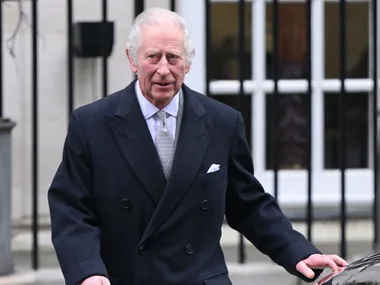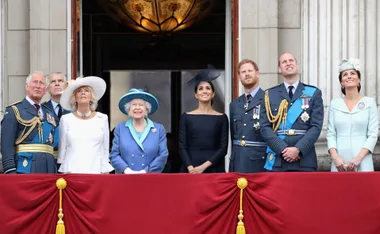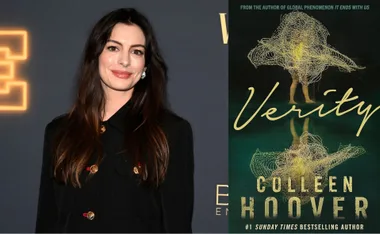Monica McInerney, whose latest book, Upside Down Inside Out (Penguin), is featured in The Australian Women’s Weekly, February issue.
Q How did you start writing?
A: I had a short story published in an Australian women’s magazine, that was my start.
Q You are one of seven children, where was your position in the family?
A: In the middle. Did I tell I’ve got deep dark secrets and psychological problems (laughing). Very handy for an author actually. I have three brothers and three sisters and we’re all eighteen months apart, being so close in age we’re all like really close friends. And they keep a very close eye on everything I write, waiting for the family history to come out. It’s good, I have a ready made audience, just they’re a bit more watchful than normal human beings.
Q What did your parents do for a living?
A: My dad died March last year, I really miss him, but he was the station master in Clare, South Australia, so we were the railway kids. We grew up in this big old house opposite the railway station in Clare and every year we’d have the railway Father Christmas come in the train and we’d all go over. We thought the trains were ours. Like if your father’s the baker you think everybody has bread. We had all these trains to play with every day. It was fantastic. And my mum looked after us and then went back to work and worked in the local library and again we had access to the library. I think it was the only way she could get around having to pay the huge overdue fines we racked up…
It was a brilliant childhood actually. Nine people in one house and an Irish background, there was lots of talk and chat and story telling and my mum and my dad were curious about people so there was always loads of visitors in the house. Really lively. It was a rambunctious way to grow up.
Q Did your grandparents come from Ireland?
A: No, back further, I think it was my great grandfather, I reckon it is or maybe even one more than that. Curiously, my mother’s grandparents and my father’s grandparents both came from County Clare in Ireland and then we ended up in Clare in South Australia which is now twin with Clare in Ireland. There’s these incredibly strong links between the two places now. In fact we’ve always married other Irish people so we’re kind of thoroughbred (laughing) immigrants if you know what I mean. Like Irish descent all the way through, which is quite unusual. I’m Monica Mary McInerney.
Q Apart from the story telling in the family, your relationship with writing and reading began in your childhood?
A: Mum’s a huge reader as well and that’s why I’m really big on the fact that if kids grow up seeing their parents read, it becomes a very natural thing to do. Before the library opened we used to have books sent from the Adelaide library on the train. I have beautiful memories of going there on Tuesday night and the train or the bus would come in from Adelaide and each would have a little wrapped up brown paper parcel that some librarian in Adelaide had chosen for us. That’s how it was in Clare. And I had really good school teachers who really encouraged us to read and write. I wrote a book when I was about nine about a family who goes to Perth on the train.
Q What was it called?
A: I think it was called The Smith Family Goes to Perth On the Train (laughing). And we used to put on lots of school plays. I grew up in a cauldron of words I guess.
Q Before becoming a full time writer, you worked at a lot of different jobs?
A: I hope to God it works out with the books because I’ll never get another job, now that people see I only stay at places two minutes. I’ve got the bug – again it’s from growing up in the country, if you want to get out you do have to travel to see as much of the world as you want to. And I’ve always loved that – when you’ve been somewhere for a few years, in a job or a country or a place, and then moving on to try something else and that’s what I’ve done. I met my Irish husband in Melbourne and he’s got the same approach. We’ve kept moving around the two of us, together.
Q Married for how long?
A: Ten years this month (February).
Q Where did you meet?
A: I was living in Melbourne working for Penguin as a book publicist. (I’ve also worked as a book publicist in Dublin and Adelaide). John’s a journalist who was working with the Sunday Herald until they closed down. He now works at Adelaide University as their media and marketing person.
Q Children?
A: No, just the two of us.
Q Cat or dog?
A: No neither, I’m mad about cats but we move around so much, I think it would be too hard.
We were living in Hobart up until about two years ago when my dad became sick so we came back to SA to be near him.
I always said that if Ireland and Australia had a baby, it would look like Tasmania. It’s got the dryness in some bits but it’s compact in the way that Ireland is – same shape.
Q When did you first go to Ireland?
A: I lived in London when I was 19. I’d been working with Here’s Humphrey – had been working there for 3 years after I finished school. Everybody used to laugh when I’d say I was writing scripts because Humphrey never speaks. I’d say it’s the perfect preparation to write romantic comedies, he’s the original strong silent type.
It was the best first job.
I went to London when I was 19, stayed there for a couple of years. Went to Ireland for the first time then, just for a week. Thought every boy would look like Bono. And there’d be singing and dancing everywhere. Of course it’s not and it was really depressed back then.
I also went to Belfast a few times. Then when I met John in Melbourne when I was 25, I went back then with him and was there for five years. Then we came back here. Lived in a farm house for the first year. Then we moved to Dublin when I got a job at a book publishers there.
Q Was being a book publicist the result of wanting to write?
A: A bit of everything I think. I loved the idea of being around books. With my mum being a librarian and then having books everywhere, it was just fantastic to work for a publisher and see how they’re made. At that stage I didn’t have any idea of being a writer. Even though I’d written all my life, either to amuse myself or when I was in PR. I never thought I’d do it as a living. Just loved it, looking after writers. I looked after people like Roald Dahl, Tim Winton and Edna O’Brien, really good writers.
Q Was Roald Dahl terrifying?
A: Yes, he was, but he took to me luckily. He asked me to do something and I did it quickly, I think if I’d taken longer I would have known a different side of him. At the end of the day he was really professional and very hard working, and that’s what they all are…I think I picked up by osmosis really, lots about the best approach just by having talked to lots and lots of authors.
Q What prompted you to be a writer ultimately.
A: I knew I wanted to be around books and I’d always been around them. I’d always been around creative people and that was leading into my own creativeness I suppose. And then when I moved to Tassie I had trouble getting work. We arrived a few days after the Port Arthur massacre and things were just desperate down there. I think that’s what sparked it. Suddenly, it was the first time I hadn’t been involved in books for probably 12 years, nothing to do with books or writing and I really missed it. And that started me writing, it was almost like I had to fill up this void that had previously been filled by me being with authors talking about books all day. What can I do to get that feeling back into my life?
I started writing and it was like a dam burst – this is what I want to do. I can remember the feeling, sitting there after I’d written the first one – I can make up things! I can do it too!
I sent short stories off everywhere, including the women’s mags. The ideas were flying out of me. It was like I had to be away from books to write my own.
Q How old were you when you were first published?
A: I’m 36 now and I was published in Ireland in November 2000 so I must have been 35. And that was A Taste For It.
Q Why did you send your first manuscript overseas and not a local publisher?
A: I was feeling shy about it, thought by sending it far away it wouldn’t hurt so much when it got rejected. I think also because I’d lived in Ireland and I’d seen the sorts of books they were publishing I reckoned my book fitted into that genre. I had it in the back of my mind to send it to them then I heard about this write a best seller competition. So I thought perfect, I’ll send it to them. So I did. Sent it off in a big padded bag and didn’t think much more about it. In the meantime, I won a trip to Ireland. John and I went off on that trip and the day I arrived in Dublin, I got a phone call from my sister in Australia who had just got a fax from the publisher in Dublin saying they loved the book and they wanted to offer me a 3 book deal.
Q What was your reaction to the news?
A: It was heaven. I made a really really high pitched sound that only the dogs in the neighbourhood could hear. It was fantastic. That feeling that I was on the verge of something, taking a new direction in my life.
Q How do you classify your books – romantic comedies?
A: I guess in terms of publishing, that’s what they are. They’re about relationships I think. The more I write the more confidence I’ll get about extending it out into lots and lots of other relationships, in the way Maeve Binchy does too. I think she’s fantastic. The feeling you get when you read her books is that you’ve been immersed in this lovely warm bath of words. I’d love to get to that stage with my writing.
Q Do you write a set number of hours a day?
A: If it’s going well I’m there at 8 in the morning and I work all the day through. Have tea with my husband when he comes home and perhaps go back again. If it’s not going well I’m like a soppy child at a school desk. I sit there. Actually if it’s not working I start washing towels. If John comes home from work and the clothes-line is full of towels he knows I’ve had a really bad day at work. I think it’s something I do to get my thoughts going.
Q How many drafts do you do?
A: Heaps. I don’t print them all out. I work on them over and over again. I work on a computer – I type straight onto the screen, I don’t keep a note-book. I do it as one big document, I don’t put it into chapters. I probably do about 5 or 6 drafts before I send it to the publisher. Then it goes through a few more drafts.
Q Do you choose your titles first?
A: Yes, I have with both of them and I’ve been allowed to keep them, which is great because often titles are changed.
Q Your new book, Upside Down Inside Out, is a story of near misses in many ways?
A It is.
Q Do you think it happens a lot in real life?
A: I reckon it does. It’s also about when you’re on holiday, there’s the temptation to be different or more interesting than you are. Neither of the main characters knows that the other one’s pretending. Although the readers know all the way along what’s going on. And I think playing around with that as well, is the question, how much do you reveal to a person when you first meet them? I don’t think you do reveal much. And you pick out the nuggets, don’t you – the nice bits about yourself?
You can’t rely on coincidences too much in stories or you stretch the imagination of the readers a bit too much, but in reality, I think it happens a lot – I mean, what about me, in Ireland for all of half an hour, still at the airport when the phone rings and I get the news of the offer from the Irish publisher for my book?
Q Who reads your manuscript first?
A: John, my husband because he’s very well read but he’s also very kind and critical in the right way. Then my sister Maura and then my other two sisters and my mum. They’re the perfect cross section with their ages and they know to say the nice things first and then criticise afterwards.
Q You classify your books as belonging to the romantic comedy genre, where do you think they sit with chic-lit?
A: I think that’s just another name for romantic comedy. They got a bit edgier in Britain, loads more sex in them, loads more shopping and a bit harder edged. I think romantic comedy is more of a warm, funny approach.
Q Your favourite writers?
A: I read everything. I love most Maeve Binchy. I LOVE John Le Carre. I think The Little Drummer Girl is one of the best books. It’s just brilliant on so many levels, from the historical to the thriller. And the tension between the male and the female. I think he’s a master, I read his books in awe. I enjoy Marian Keyes very much. And Tim Winton and Isabel Allende.
Q What do you aspire to achieve as a writer?
A: I keep thinking I want to get to the stage where it’s easy, which is silly, because it’s never going to be easy and I know that from all the authors I escorted around for years. You go through that same process with every book. I hope I can achieve a better understanding of my strengths and what I can pull off as a writer. You find your own voice I suppose.
I would love to be able to write a book a year and have them published and have people read them and enjoy them.
Q What about fame and success?
A: I’d love the freedom of world fame, so that John could give up work. Because I become quite lonely writing. I’ve always worked with lots of people around so it would be nice to have John…I don’t know (laughing) to sit quietly and wait for when I need to talk to him.
Q To make toast and tea?
A: Exactly. But I would love that. And to be able to live six months here and six months in Ireland. That would be the dream.
Newsletter conversion description. Get the latest in your inbox.
















































